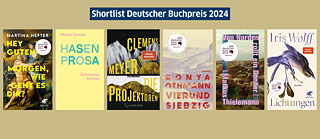The shortlist for this year's German Book Prize is out! It has now been decided which six authors can hope to win the prestigious and lucrative prize with their latest novels.
Now it's finally official: the seven jury members have decided which six novels will make the final shortlist for the German Book Prize 2024. Novels were selected for the shortlist "that explore the light and darkness of our recent history in new ways, and that overcome narrative boundaries while also being great literary adventures," said jury spokesperson Natascha Freundel, editor at rbbKultur, in the official announcement.Four female authors and two male authors have been shortlisted for this year's German Book Prize. The nominees are:
- Martina Hefter: Hey guten Morgen, wie geht es dir? (Hey good morning, how are you?)
- Maren Kames: Hasenprosa (Rabbit prose)
- Clemens Meyer: Die Projektoren (The Projectors)
- Ronya Othmann: Vierundsiebzig (Seventy-four)
- Markus Thielemann: Von Norden rollt ein Donner (A thunder rolls from the north)
- Iris Wolff: Lichtungen (Clearings)
War and violence
According to NDR Kultur, war and violence is a central theme in several nominated novels, such as Ronya Othmann's Vierundsiebzig (Seventy-four), which deals with the genocide of the Yazidis in northern Iraq by the Islamic State terrorist militia in August 2014. "A unique documentary novel about a contemporary genocide," said the Book Prize jury.Clemens Meyer's Die Projektoren (The Projectors) is also about wars. In more than a thousand pages, he writes about the wars in Yugoslavia in the 1990s, but also about the Second World War. It is moreover about the Karl May films that were shot in Croatia in the 1960s. Meyer's narrative is enormously rich in connections, with a multitude of characters and stories. For the Book Prize jury, Die Projektoren is quite simply "a literary event".
Iris Wolff's novel Lichtungen (Clearings) is set during the Ceausescu dictatorship in Romania. It is a coming-of-age and love story of two people who set off and can no longer arrive anywhere. According to the jury, Wolff tells it "with great sensitivity and sophistication, ... in retrogression."
Romance scammers, rabbits, sheep and wolves
Martina Hefter's novel Hey guten Morgen, wie geht es dir? (Hey good morning, how are you?) sounds like a banal text message, but it is about two main characters with meaningful names and existential problems. During the day, performance artist Juno looks after her husband Jupiter, who has a severe form of multiple sclerosis. At night, she falls for a "romance scammer", the modern version of a marriage swindler. Martina Hefter portrays Juno's inner turmoil in a way that is "relatable and reflective, wise and poetic, tender and unsentimental."Maren Kames has written a challenging book with Hasenprosa (Rabbit prose). It features a rabbit reminiscent of Alice's Adventures in Wonderland and many new word creations. The Neue Zürcher Zeitung (NZZ) describes it as a "wild ride through reality and imagination", it "hops light-footedly away from dull realism", according to the Book Prize jury.
Markus Thielemann's novel Von Norden rollt ein Donner (A thunder rolls from the north) is set in the Lüneburg Heath and the main character is a 19-year-old shepherd. But the idyllic landscape is deceptive. Not only do wolves threaten the shepherd's existence, but the shadows of the past also weigh heavily on the young man. According to the jury, Thielemann has succeeded in writing a slowly told anti-homeland novel. It tells of "the entanglements between idyll and ideologies and about the dangers inherent in silence, repression and the glorification of the old."
The most important award for German-language literature is being presented for the 20th time this year. The book prize is awarded by the Stiftung Buchkultur und Leseförderung des Börsenvereins des Deutschen Buchhandels (Book Culture and Reading Promotion Foundation of the German Publishers and Booksellers Association). We will find out which of the six nominees will receive this year's German Book Prize on 14 October 2024 at the start of the Frankfurt Book Fair. The award ceremony will take place in the Kaisersaal of Frankfurt's Römer (city hall of Frankfurt) and will be broadcast live. Interested parties can follow the award ceremony on the German Book Prize website.
Martina Hefter: Hey guten Morgen, wie geht es dir? Roman
Stuttgart: Klett-Cotta, 2024. 224 p.
ISBN: 978-3-608-98826-0
You can find this title in our eLibrary Onleihe.
Maren Kames: Hasenprosa. Roman
Berlin: Suhrkamp, 2024. 182 p.
ISBN: 978-3-518-43168-9
You can find this title in our eLibrary Onleihe.
Clemens Meyer: Die Projektoren. Roman
Frankfurt a.M.: S. Fischer, 2024. 1056 p.
ISBN: 978-3-10-002246-2
Ronya Othmann: Vierundsiebzig. Roman
Hamburg: Rowohlt, 2024. 512 p.
ISBN: 978-3-498-00361-6
You can find this title in our eLibrary Onleihe.
Markus Thielemann: Von Norden rollt ein Donner. Roman
München: C.H. Beck, 204. 287 p.
ISBN: 978-3-406-82247-6
You can find this title in our eLibrary Onleihe.
Iris Wolff: Lichtungen. Roman
Stuttgart: Klett-Cotta, 2024. 256 p.
ISBN: 978-3-608-98770-6
You can find this title in our eLibrary Onleihe.
Stuttgart: Klett-Cotta, 2024. 224 p.
ISBN: 978-3-608-98826-0
You can find this title in our eLibrary Onleihe.
Maren Kames: Hasenprosa. Roman
Berlin: Suhrkamp, 2024. 182 p.
ISBN: 978-3-518-43168-9
You can find this title in our eLibrary Onleihe.
Clemens Meyer: Die Projektoren. Roman
Frankfurt a.M.: S. Fischer, 2024. 1056 p.
ISBN: 978-3-10-002246-2
Ronya Othmann: Vierundsiebzig. Roman
Hamburg: Rowohlt, 2024. 512 p.
ISBN: 978-3-498-00361-6
You can find this title in our eLibrary Onleihe.
Markus Thielemann: Von Norden rollt ein Donner. Roman
München: C.H. Beck, 204. 287 p.
ISBN: 978-3-406-82247-6
You can find this title in our eLibrary Onleihe.
Iris Wolff: Lichtungen. Roman
Stuttgart: Klett-Cotta, 2024. 256 p.
ISBN: 978-3-608-98770-6
You can find this title in our eLibrary Onleihe.
September 2024
